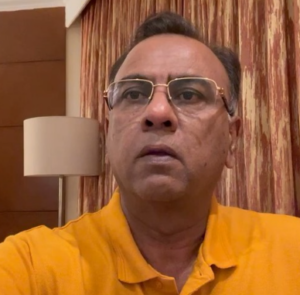Basit Ali’s opinion on Virat Kohli batting at No. 3 in the upcoming Perth Test is a strong one, backed by both logic and experience
Kohli’s history of success in Australian conditions, combined with the demands of batting at No. 4, suggests that any change to his batting position would be a risky move.
India’s best chance of succeeding in the 2024-25 Border-Gavaskar Trophy lies in allowing Kohli to focus on his strengths and not burdening him with unnecessary adjustments in his role.
Given the absence of key players like Rohit Sharma and Shubman Gill, it is important that India does not make decisions that could disrupt Kohli’s natural game.
As the series progresses, the focus should be on providing stability to the batting lineup, and Kohli’s position at No. 4 should remain unchanged for India to capitalize on his experience and skill in the crucial battle against Australia.
The 2024-25 Border-Gavaskar Trophy will be a series that will go down in history for various reasons. Australia’s change in approach, influenced by the IPL, marks a shift in the psychological battle between the two sides.
India’s quest to qualify for the World Test Championship final adds an additional layer of excitement. With the leadership dynamics, star players on both sides, and a fiercely competitive atmosphere, this series promises to deliver one of the most thrilling contests in recent memory.

Also Read: Nick Hockley’s Five-Year Journey as Cricket Australia CEO Comes to an End
Table of Contents
Basit Ali: Changing Dynamics of Australia vs. India Rivalry
The upcoming 2024-25 Border-Gavaskar Trophy between India and Australia is set to be a high-stakes affair.1
With a five-match Test series starting in Perth on November 22, the expectations are high, and the atmosphere is charged.
The series marks the first time in over three decades that these two cricketing giants will face off in a five-match Test series. This historic clash is not only significant for its competitive nature but also for the changing dynamics of the rivalry
Former Pakistani batter and cricket analyst Basit Ali has suggested that Australia will likely adopt a more restrained approach in their psychological warfare, avoiding the sledging that has historically been a hallmark of their cricketing style. The reason, according to Basit, is the growing influence of the Indian Premier League (IPL).
Good luck Wahab mian, advisor to Chairman PCB pic.twitter.com/8FLESEkLKi
— Basit Ali (@BasitAOfficial) November 17, 2024
Australia’s Shift in Approach: IPL’s Influence
- Australia’s cricket team has been known for its aggressive and often confrontational style, particularly in high-stakes series.
- Their psychological warfare tactics, including sledging, have been a part of their arsenal for years. The Australian team’s aggressive approach to the game was evident during their home series, where the players would frequently engage in verbal sparring with their opponents.
- However, Basit Ali believes that the dynamics have shifted, especially with the increasing participation of Australian players in the Indian Premier League (IPL).
- Basit pointed out in a YouTube video that Australia’s approach is likely to be different this time due to the IPL factor. He explained, “There won’t be a lot of sledging from Australia because they now also play in the IPL.”
- Australian cricketers, including big names like Steve Smith, David Warner, and Pat Cummins, have built professional relationships with Indian players through the IPL.
- The camaraderie developed on the IPL circuit could influence their behavior on the field during the Border-Gavaskar Trophy, leading to a more respectful and measured approach rather than the aggressive sledging of past series.

Basit Ali: The Evolution of Sledging
A New Era of Respect
In the past, sledging was an integral part of Australia’s psychological tactics. The infamous ‘mental disintegration’ strategy, often spearheaded by players like Shane Warne and Glenn McGrath, was aimed at unsettling opponents and gaining an upper hand through verbal and mental pressure.2
However, the atmosphere in international cricket has evolved over the years, with an increasing focus on sportsmanship and mutual respect among players.
Basit Ali highlighted this change by recalling the 2023 series in India, where he observed that the Indian team refrained from engaging in sledging despite Australia’s history of mental warfare. “When they came to India, did the Indians do any sledging?” Basit asked rhetorically.
His point was that the atmosphere around cricket has softened, and both teams now prefer a more respectful competition. This evolution in cricket’s culture is partly due to the globalization of the sport, with players spending more time in T20 leagues, forming friendships and professional relationships across borders.
The IPL, in particular, has played a crucial role in this shift. Australian players have spent significant time in the Indian league, where they’ve shared dressing rooms with Indian cricketers.
This mutual respect has inevitably spilled over into their international encounters, making it less likely for either side to engage in verbal altercations during the Border-Gavaskar Trophy.
A Key Concern for India
While the IPL factor may influence the Australian team’s approach, there are other concerns for both sides. One of the biggest talking points for India in the lead-up to the series is the captaincy of Jasprit Bumrah.
With regular captain Rohit Sharma absent, Bumrah is set to lead the Indian team in the series opener. However, Basit Ali expressed doubts about Bumrah’s leadership skills, noting his underwhelming captaincy during India’s previous series against England.
Basit remarked, “I saw his captaincy against England, it was not so impressive.” While Bumrah is a world-class bowler with an impeccable track record in limited-overs cricket, his leadership credentials are still a work in progress. Leading a team in a Test series, especially against a formidable opponent like Australia, presents a different challenge, and the pressure could be immense.
However, with seasoned players like Virat Kohli and Ajinkya Rahane in the team, Bumrah is expected to receive advice and support from his senior colleagues to navigate the responsibilities of captaincy.

Basit Ali: World Test Championship Qualification
The stakes in this series are incredibly high for India, as they need to win by a 4-0 margin to secure automatic qualification for the World Test Championship 2023-25 final.3
The Indian team’s recent success in Australia, having won the last two Border-Gavaskar series, has given them a psychological edge. However, this series will be different, with the added pressure of World Test Championship points on the line.
The Indian team’s recent form has been stellar, but winning a Test series by such a dominant margin will require extraordinary performances from all their key players.
A Five-Match Test Series: A Historic Showdown
- The Border-Gavaskar Trophy is always an eagerly anticipated series, but the 2024-25 edition holds special significance. It’s the first time since the 1991-92 series that the two teams will compete in a five-match Test series.
- This extended format allows for greater drama, more opportunities for individual players to shine, and a deeper test of both teams’ resilience and skill. The series promises to be an exciting contest, with both teams possessing world-class players.
- For Australia, this will be an opportunity to assert their dominance on home soil. The Australian team, led by Pat Cummins, has a formidable bowling attack, and with players like Steve Smith and David Warner, their batting lineup can never be discounted.
- Australia’s home advantage, especially in Perth, will be crucial to their chances. The fast, bouncy tracks in Perth are expected to favor the Australian pacers, which will put pressure on India’s top-order batsmen.
- On the other hand, India’s formidable spin attack, spearheaded by Ravichandran Ashwin and Ravindra Jadeja, could pose a significant threat to Australia, particularly as the series progresses and the wickets begin to wear down.
- India’s top-order, including Virat Kohli, Rohit Sharma (when available), and Shubman Gill, will need to fire if they are to achieve the historic 4-0 win needed for World Test Championship qualification.

Also Read: Hayley Matthews (Cricketer): Who Is She? Bio, Wiki, Age, Career, Net Worth 2024 and Net Practice
Basit Ali: Virat Kohli Should Not Bat at No. 3 in the Perth Test
The first Test of the 2024-25 Border-Gavaskar Trophy between India and Australia is expected to be an intense clash, given the formidable reputation of both teams.
In light of the absence of Rohit Sharma and Shubman Gill’s injury, India is left searching for solutions to strengthen their batting lineup. One of the most significant decisions is the batting order, particularly the position of senior batter Virat Kohli.
Following a recent trend where Kohli batted at No. 3 during India’s home series against New Zealand, former cricketer Basit Ali has strongly advised against Kohli being asked to continue at this position for the upcoming Test in Perth.
The Debate Over Kohli’s Position in the Line-Up
Virat Kohli’s batting position has been a topic of discussion for many in recent times, with varying opinions on where he should bat.
Kohli, a seasoned cricketer with over 8,000 Test runs to his name, has predominantly batted at No. 4 for most of his career.
However, in India’s previous Test against New Zealand, Kohli stepped up to bat at No. 3 in the absence of Shubman Gill. While the move seemed reasonable in a home series, there is a growing concern that asking Kohli to play at No. 3 against Australia in Perth could be a mistake.
Basit Ali’s warning reflects these concerns. He believes that such a change could affect Kohli’s natural game and, consequently, India’s chances of success in the high-stakes Test series.
Kohli’s Historical Success in Australia
Before delving into Basit Ali’s opinion, it’s important to acknowledge Virat Kohli’s remarkable history in Australia. The right-handed batter has been one of India’s most successful players on Australian soil, amassing 1352 runs in 25 Test innings at an impressive average of 54.08.
These numbers make Kohli one of the most reliable players for India in Australia, a country known for its challenging conditions, especially for visiting teams.
Kohli’s performances have often been key to India’s victories Down Under, and his ability to thrive in the demanding conditions of Australian pitches is undisputed. This success has led to his reputation as one of the modern greats of Test cricket.
However, Basit Ali argues that Kohli’s success is largely attributed to his batting at No. 4, a position where he has consistently delivered for India over the years.

Basit Ali’s Concerns Over Kohli at No. 3
According to Basit Ali, asking Virat Kohli to bat at No. 3 for the Perth Test against Australia would be a poor decision.
In his opinion, it is crucial to understand the challenges of playing on Australian pitches, which are often pace-friendly and conducive to swing and bounce.
Ali explained that the Indian team had been preparing spin-friendly pitches in recent times, but in Australia, Kohli’s batting would require a different approach due to the pace and bounce of the pitches.
Ali emphasized that Kohli is a master of playing spin bowling, but the Australian conditions demand a different skill set. He cautioned that if Kohli were to bat at No. 3, the pressure to adjust to the conditions could potentially disrupt his natural game, particularly against the formidable Australian fast-bowling attack.
As Kohli is one of the most experienced and valuable players for India, Basit believes that any decision that could risk his form or affect his concentration should be avoided.
The Importance of Batting at No. 4
Basit Ali’s remarks shed light on why No. 4 is a critical batting position for Kohli. Historically, the No. 4 spot allows the batter to take the crease when the team is either recovering from an early setback or building on a solid start.
It is a position that demands adaptability, mental strength, and the ability to control the game at various stages of an innings. Kohli has proven his mettle in this role, adjusting seamlessly to different situations and making significant contributions to India’s success.
In the absence of key openers like Rohit Sharma and Shubman Gill, the No. 3 position would see Kohli come in potentially under pressure with the top order already exposed.
This would place undue strain on Kohli, forcing him to shift from his usual responsibilities at No. 4 to a new role where the demands are different. Ali warned that this could disrupt Kohli’s natural rhythm and make it harder for him to focus on his strengths against the Australian bowlers.
Pressure on Kohli in Rohit Sharma’s Absence
Another key factor that Basit Ali mentioned is the increased responsibility that Virat Kohli will face in Rohit Sharma’s absence.
As one of the senior members of the squad, Kohli will be under heightened scrutiny, especially with younger players like Shubman Gill and Rishabh Pant also facing pressure. Ali emphasized that Kohli’s ability to handle this pressure will be pivotal to India’s success.
In the absence of Rohit Sharma, who has proven to be an invaluable presence at the top of the order, Kohli’s leadership with the bat will be crucial.
However, Ali is concerned that if Kohli is pushed to bat at No. 3, the added stress of a new batting position could affect his performance, both mentally and physically. Given Kohli’s track record of thriving under pressure, his batting position should not be altered unnecessarily, especially in such a crucial series against a high-caliber opponent like Australia.
Kohli’s Role in India’s Success
In the end, Basit Ali made it clear that Kohli needs to be at his best for India to stand a chance against Australia.
Ali remarked that if Kohli were to perform as he did during India’s recent series against New Zealand, where his batting showed signs of struggle, the Indian fans would be disappointed.
Kohli, known for his consistency and ability to perform in big moments, needs to return to his vintage form to guide India through the challenges of the Border-Gavaskar Trophy.
Kohli has the pedigree and experience to succeed in the Australian conditions, but Ali insists that forcing him into a new role at No. 3 could undermine his chances.
For Kohli to make a significant impact, India needs to provide him with a stable batting position that allows him to play to his strengths, particularly in such high-pressure matches.
Also Read: MLC 2024 Challenger: Corey Anderson’s (Cricketer) Unbelievable Catch Stuns Fans




